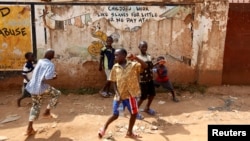Human Rights Watch is accusing Ugandan authorities of widespread abuse of street children. No one knows how many children are living on the streets of towns and cities throughout Uganda, but one thing is certain: their lives are very hard. Along with hunger and neglect, these children also suffer physical abuse.
In a new report by the New York-based Human Rights Watch released Thursday, many of the abusers are police and local authorities.
The report says the abuse includes beatings with batons, whips and wires, as well as detention in police cells, often with adult suspects. Police also extort money from street children, it adds, forcing them to hand over the little cash they have.
Maria Burnett from Human Rights Watch said many communities, as well as local authorities, see street children as a source of crime. This perception, she added, puts them at even greater risk.
“Some of these children that we interviewed were very, very young - they’re 10, 11 [or] 12 years old. They’re working hard to be able to just find enough to eat. So when they can’t turn to the police or local officials for protection, it puts them in real jeopardy,” said Burnett.
Uganda has one of the youngest populations in the world, with more than half of the population under the age of 15. Poverty tends to hit children the hardest, says Burnett.
According to Ugandan police and civil society groups, the number of street children is on the rise. Ugandan authorities need to create shelters where these children will not be treated like criminals, Burnett said, but more permanent solutions need to be found as well.
“They need to address the root causes that force impoverished and vulnerable children onto the street, not sort of beat them into submission. Because by beating them, it clearly doesn’t resolve the problem, and it puts them in further jeopardy,” said Burnett.
A spokesman for Uganda’s Ministry of Gender, Labor and Social Development denies that street children are being abused. He said homeless children are placed in a rehabilitation center for counseling and resettlement, and that the ministry has plans to address the issues that push them onto the streets in the first place.




